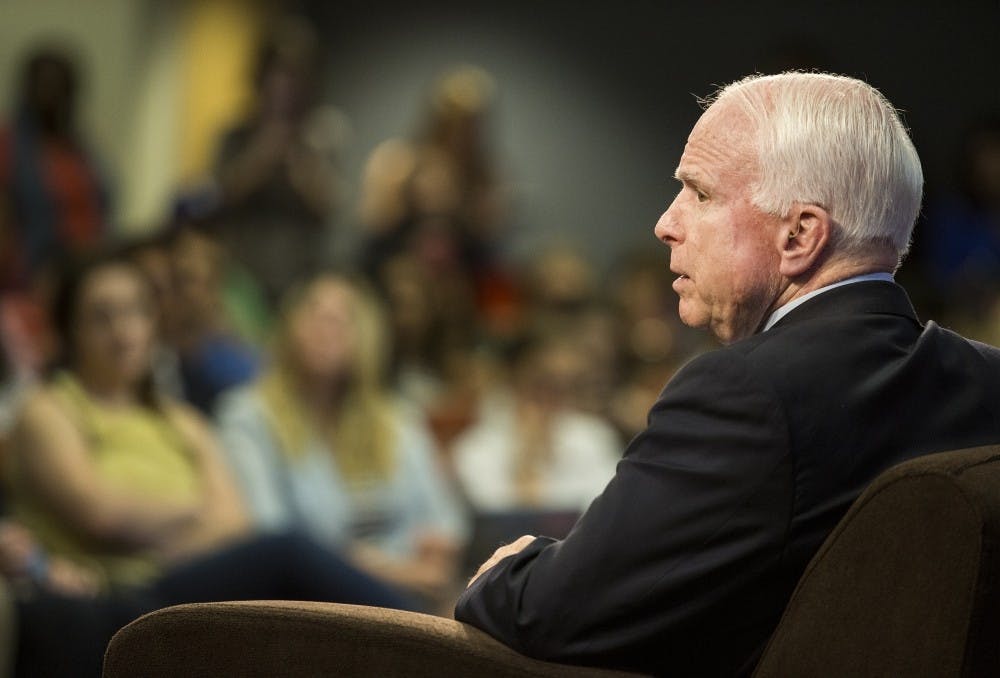The man who has made his name in Washington, D.C. by being a maverick in his party is thwarting President Donald Trump again.
Sen. John McCain (R-Ariz.) is co-sponsoring a bill which would block Trump’s transgender ban. The ban, which was announced on Twitter in July, dictates that transgender members of the military who are currently serving could be removed from their positions. The order would also ban transgender people from enlisting.
The ban is currently in limbo as Defense Secretary James Mattis assembles a panel of experts to decide how best to enact the ban.
S. 1820, the bill which aims to block President Trump’s transgender ban, is sponsored by Sen. Kirsten Gillibrand (D-NY) and co-sponsored by McCain, Sens. Jack Reed (D-RI) and Susan Collins (R-Maine).
The bill has three parts. First, it states that “individuals who are qualified and can meet the standards to serve in the military should be eligible to serve.”
Second, it states that currently serving members of the military cannot be “involuntarily separated” or “denied reenlistment or continuation” on the basis of their gender identity. This section of the bill also explicitly states that transgender military members are not exempted from meeting military and medical standards.
Third, the bill places a deadline of Dec. 31, 2017 for the completion of Mattis' review.
Samuel Potter, a transgender sophomore majoring in Japanese, said he was disappointed by Trump's transgender ban but not surprised.
“The legislations are rolling out one by one. … We are basically being put back in time before (former) President Obama’s presidency,” Potter said. “It’s disappointing, but I kind of saw it coming.”
As a candidate, President Trump promised to “fight” for the LGBTQ community. Potter said it’s now clear that Trump is not a man of his word.
“It’s something the president has turned his back on,” Potter said.
But Potter said he finds hope in the senators' attempt to block Trump’s transgender ban legislation.
“All politicians have their good and bad sides,” Potter said. “But it does give me some hope in regards to there are senators who are actually looking forward as opposed to looking back.”
McCain has long been a vocal opponent of Trump. After originally endorsing Trump for the presidency, McCain rescinded his support after the Access Hollywood tape.
More recently, McCain was the deciding dissenting vote on a so-called "skinny" repeal of Obamacare, a central tenet of the Trump campaign. This week, McCain stated he would vote against a now-dead effort to repeal and replace Obamacare.
Judah Waxelbaum, a political science freshman who worked on Trump and McCain's 2016 campaigns, expressed disappointment in McCain’s divergence from the president’s agenda.
“I understand that John McCain needs to vote his conscience, but his recent votes are not what we campaigned on in 2016,” Waxelbaum said.
Waxelbaum said he considers McCain to be a military expert but questions the role of senators in military matters.
“I do not believe that the Congress has the right to legislate how the army functions within,” Waxelbaum said. “This is not a social issue, this is a hiring issue and the hiring is at the discretion of the chain of command.”
Waxelbaum said he can’t fault McCain for co-sponsoring the bill because McCain has always “put his personal beliefs before party or anything else.”
David Wells, a professor of political science at ASU, said McCain co-sponsoring this bill lends it more credence since McCain is the Chairman of the Senate Armed Services Committee.
Wells noted that a Republican senator targeting policy from a president in his own party is atypical.
“It’s more common that the opposite party does these efforts,” Wells said.
McCain co-sponsoring the bill is even more surprising in light of his 2010 vote against repealing the military’s “Don’t Ask, Don’t Tell” legislation.
“Senator McCain hasn’t ever been on the leading edge of LGBTQ issues at all,” Wells said.
As for the motivation behind McCain’s change of heart, Wells said it may stem from McCain's adherence to senatorial procedure and tradition. The senior Arizona senator has urged the Senate to return to regular order, and a tweet from the president announcing a major change in military policy is well outside of regular order, Wells said.
“My guess is what’s motivating him here is the process,” Wells said.
McCain, who was recently diagnosed with brain cancer, may "have an eye toward his legacy now,” Wells said.
Reach the reporter at flatifi@asu.edu or follow @fortesalatifi on Twitter.
Like State Press on Facebook and follow @statepress on Twitter.




